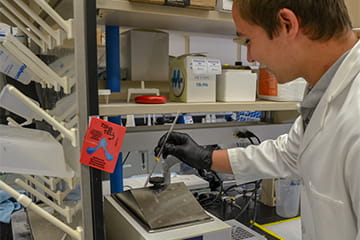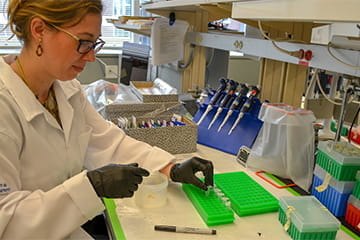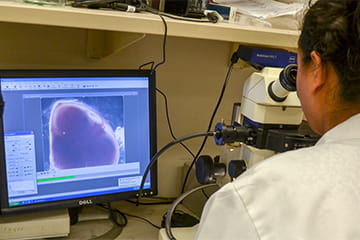
Cancer
One focus of the Indiana Institute for Personalized Medicine’s efforts is on cancer therapies. These therapies are complex in that the disease they are designed to treat is often life-threatening and, in some cases, these drugs can prolong survival or even improve the chance for cure. Many of the therapies available also have substantial side effects, and not everyone benefits. This leaves patients with difficult decisions about the best therapies for themselves. More recently, it has become apparent that personalized medicine (finding the best drug for each patient) is a critical step forward in improving the effectiveness and reducing the toxicity in the care of cancer patients.

Pharmacogenomics
Pharmacogenomics is the study of how an individual’s genetic code affects the way the body responds to drugs. The field of pharmacogenomics is relatively new with the promise that medications can be tailor-made for each individual through a better understanding of the mechanisms underlying the genetic variability and its response to therapy. At IU School of Medicine, researchers doing pharmacogenomics research are trying to better understand the relationship between genomics and drug response to improve the practice of medicine by enhancing the personalization of therapy. The Indiana Institute for Personalized Medicine, in collaboration with the IU School of Medicine Department of Medical and Molecular Genetics, has developed a CLIA-certified pharmacogenomics lab.

HIV
The goal of effective and safe therapy of many drugs is made difficult by large inter-individual variability in response to these drugs, which significantly adversely influences the cost of health care and is of major concern for patients and their caretakers. Although potential causes for variable drug effects are multiple, pharmacokinetics changes and unpredictable drug interactions that ensue are frequent and major causes of unpredictable drug effects. The majority of currently marketed drugs are eliminated primarily by metabolism. Therefore, the main focus of research in the lab of Zerusenay Desta, PhD is identification of genetic and non-genetic mechanisms of inter-individual variability in drug disposition, drug-drug interaction and response.

Pregnancy
Pregnancy presents unique issues relevant to personalized therapeutics. Physiologic changes in pregnancy lead to increased volume of distribution, an extra compartment (the baby) and changes in drug metabolizing and transporting capabilities. Additionally, about three in four pregnant women are given a prescription for a non-vitamin medication during pregnancy. All of these factors make the study of drug therapy in pregnancy an important part of therapeutic studies. Through the Center for Pharmacogenetics and Therapeutics Research in Maternal and Child Health (PREGMED) at IU School of Medicine, researchers are performing cutting-edge research on pharmacogenomics and individualized therapy in pregnancy, focusing on conditions such as pre-term labor, nausea and vomiting in pregnancy, depression in pregnancy and diabetes in pregnancy. Uniquely merging interests in obstetrics, neonatology and clinical pharmacology, IU School of Medicine is leading and participating in several federally funded studies to make drug therapy more individualized in pregnancy.

Imaging
The overarching goal of IU School of Medicine’s pharmacogenomic research in imaging is to investigate the role of genetic variation in disordered brain function using neuroimaging and biomarkers as phenotypes and to identify potential surrogate biomarkers for therapeutic trials. Major approaches include the development and application of state-of-the-art computational and informatics methods and tools for independent and combined analyses of the following multi-modal, heterogeneous imaging, genetics, and other biomarker data: (a) Imaging modalities: MRI (structural, fMRI, DTI, PASL, MRSI), PET; (b) Other measures: CSF and blood biomarkers, neuropsychological assessments; (3) Genetic variation: GWAS (SNP, CNV), pathways, targeted sequencing. Disorders being investigated include Alzheimer’s disease and mild cognitive impairment, breast cancer (neurocognitive effects of chemotherapy and hormonal interventions), mild traumatic brain injury, schizophrenia and other conditions.

Computational Biology and Bioinformatics
Large scale bio-technologies enable biologists and clinicians to probe the human genome and proteome unbiased. Bioinformatics research on protein/gene sequences, structures, and functions facilitates biomarker discovery and validation for drug response prediction. System biology research on the gene/protein networks further extends understanding of drug response mechanisms at the molecular level. Literature and medical record text mining on drugs, genes, diseases, and their associations reveals new drug targets and new predictors for drug responses.